War Resisters' International Office and Executive Report August 2014 – September 2015
Since the historical conference in Cape Town in the summer of 2014, the WRI office and network have continued to do important work around the world, supporting Conscientious Objectors, taking action against military bases and arms production, countering military recruitment, resisting police militarisation, spreading the word about nonviolent resistance and creating networks to support each other and be stronger together.
During this last year, there have been quite a few new things in the WRI office and organisation. At the last Assembly, a new Council, Exec and Chair were elected, continuing the work from the previous post holders. Countering the Militarisation of Youth, an area of work that used to be part of the Right to Refuse to Kill programme, has developed into a programme of it’s own, staffed by Semih Sapmaz two days a week. Depending on how successfully fundraising goes, we'll see if this be developed into a full-time programme. For the Nonviolence Programme, Javier Gárate has left the WRI office (but not the network) and Andrew Dey, who has previously worked with WRI on the Handbook for Nonviolent Campaigns, has taken over. Among WRI's publications, a second edition of the Handbook for Nonviolent Campaigns was released in July and upcoming is a book for Conscientious Objection movements, which is put together by Elisa Haf, who has been a Quaker Peace and Social Witness peace worker at the WRI office during the last year.
In this report you will find a more detailed account of the WRI programme activities during the last year. The report also contains information on WRI's work in different regions of the world, WRI internal business, WRI publications, statements and press releases, WRI’s financial situation and an outlook for the coming year.
Working for peace and justice in this violent world is a hard job and done in many different ways. Although not always an easy task, we get stronger and wiser when we connect and learn from each other. The world is home to far too many wars and militarised conflicts, but where there is oppression there is always resistance. An ongoing challenge for WRI's work is to find ways to connect more fully with different struggles resisting wars and militarism around the world.
Contents
- Nonviolence programme
- Right to Refuse to Kill programme
- Countering the Militarisation of Youth programme
- WRI in the regions
- WRI Internal
- Publications
- Statements & Press Releases
- Finances & fundraising
- Outlook for the Coming Year
Nonviolence programme
Staff changes
The biggest change for WRI's Nonviolence Programme in 2015 was the handover from Javier Gárate, who worked at WRI for ten years, to Andrew Dey. Andrew is working on the Nonviolence Programme for four days a week.
Programme activities
Nonviolence training
At the WRI Council meeting in Cape Town, in 2014, it was proposed that the programme works with activists in the Eritrean diaspora community to develop a training programme to enhance the work of Arbi Harnet ('Freedom Friday'). Preparations and fundraising for this work are ongoing and we have brought together a small group of organisers from WRI and Arbi Harnet and identified two trainers to lead the training. This will take place in the Spring of 2016, in the US.
WRI's Latin American Network plans to hold a nonviolence training specifically focused on fear and activism in challenging environments, in Mexico City, in September 2015. This will coincide with the first anniversary of the disappearance of 43 students in Mexico. The training will be in Spanish and will be attended by people from across Latin America. This training has helped to build links with new individuals and groups in the region.
Resources
We released the second edition of the Handbook for Nonviolent Campaigns at the 'Small Actions, Big Movements' international conference in July 2014, and since then have sold over 1,000 copies which contained contributions from over 30 people from across the WRI network.
Money was raised by a crowdfunding campaign to fund the translation of the second edition into Spanish, and work on the layout and design work is nearly finished – we hope the second edition will be available in Spanish by early September. Volunteers are working on other translations, into French, German, Tigrinya (spoken in Eritrea), Romanian and Turkish. At the Small Actions, Big Movements' conference we were also happy to see the printed translations of the first edition into Korean.
This edition has also been translated into Slovak this year, and is available free on the WRI website here.
The nonviolence programme committee has been discussing ideas for a new nonviolence resource, with a specific focus on 'constructive programme' – Gandhi's term for 'building a new world in the shell of the old'.
A concrete plan is emerging, and we hope to develop a resource that explores the ways that militarism, patriarchy, racism and other forms of social injustice can be challenged by building new structures and institutions and how projects that meet our primary daily needs can also be considered acts of resistance. We feel this work around “constructive programme” could also develop into a specific part of our training.
War profiteers
A key element to WRI's work countering war profiteers has been the preparations for the international seminar 'Stopping the War Business', to take place in October 2015. The seminar will bring together activists from all over the world to learn from each other's tactics and strategies, and will be followed by nonviolence training and direct action against the ADEX arms fair. The preparations for the seminar have helped to build links with new groups and individuals and our analysis of war profiteering. The seminar will particularly focus on the ways that activists and movements are challenging and resisting war profiteering.
War Profiteers' News is our bi-monthly newsletter on war profiteers and the actions taken against them. It continues to be a source of news for anti-militarists taking action against war profiteering, and a useful way of networking with new groups and issues. The newsletter often includes a 'war profiteer of the month' and a 'campaign of the month'.
Fundraising
Alongside members of the fundraising committee, there is a particular drive this year to ensure the financial sustainability of the nonviolence programme, and a significant amount of staff time has been spent identifying potential funders and presenting them with project proposals. Fundraising is now a regular part of discussions with members of the nonviolence committee. Fundraising for specific projects – like the Arbi Harnet training, or the translation of the Handbook for Nonviolent Campaigns – has been successful, but we need to ensure that the core work of the programme is also supported financially.
Evaluation
Achievements
- We were very pleased with the reception of the second edition of the Handbook for Nonviolent Campaigns, and the speedy translations of the book.
Challenges
- The funding issue with the nonviolence programme will continue to be a priority and remains a significant challenge for the programme in the coming months.Programme activities
Right to Refuse to Kill programme
Programme activities
Conscientious Objection: A Practical Companion for Movements
This year, WRI have been very lucky to host (part-time) a Quaker Peace and Social Witness Peace worker, Elisa Haf (see staff section for more info). Elisa has been working to edit a new book, "Conscientious Objection: A Practical Companion for Movements".
It's inspired by our “Handbook for Nonviolent Campaigns”, designed by activists for activists, sharing experiences, strategies and inspiration for using conscientious objection as a nonviolent strategy against militarism. Rather than an academic text, it is meant to help CO movements in their campaigns. It is being authored by over thirty contributors from Latin America, Europe, North America and the Middle East.
It will be available for sale in English from September, and in other languages later and will be available for free online. We are using Crowdfunding to cover the costs of publishing, which will include the option of buying a copy of the book and, rather than keeping it, sending it to a CO movement.
We have already had some offers for translation for the book, and if you are interested in arranging the translation of this resource into your own language, please write to hannah@wri-irg.org
Work with country movements
Rwanda
A number of Rwandan activists attended WRI's 2014 International Conference in Cape Town, and a new piece of work for the RRTK programme was proposed. From December 2014, a Rwandan activist has been interviewing Rwandan ex-combatants now living in exile. These interviews were jointly funded by WRI and Connection e.V. (a German organisation working with COs), and will form the basis of a report to the UN Human Rights Committee.
Eastern Mediterranean network of CO and war refuser groups
The Eastern Mediterranean network of CO and war refuser groups (established in 2014 with a meeting in Cyprus) continues to communicate via email. Some of these groups have also signed up for shared statements this year, including 'Solidarity with the Egyptian Conscientious Objector Mark Nabil Sanad'.
In December 2014, several groups took part in solidarity actions for imprisoned CO in Cyprus, Haluk Selam Tufanlı. Simultaneous events were held in Athens, Istanbul, Nicossia and London.
Members from the Druze resister movement Urfod (Refuse: Your People Will Protect You) attended the attended an international CO symposium hosted by Vicdani Ret Derneği (the Turkish CO association) in Sepotember 2015. Members of the Right to Refuse to Kill Committee also joined the symposium, and Hannah gave a talk on war profiteering and links to conscientious objection. Following the symposium, over twenty people publicly declared their conscientious objection in Galatasaray Square.
In the coming year, it will be important to continue the conversations within this group, and consider how/if the network wants to continue working together. This might include another meeting, joint action days, or joint campaigns.
South Korea
We continue to work closely with World Without War in Korea on conscientious objection (as well as preparing for the Stopping the War Business conference in October). We also work together with other organisations in pressuring for the rights of COs in the Republic of Korea – which we believe imprisons more COs than the rest of the world put together
This year, this has included:
- A joint Amicus Curiae (a third party opinion submitted by someone/a group who is not party to the case) opinion to the Constitutional Court of Korea. This opinion was submitted in September 2014 in relation to cases brought against the government by six Jehovah's Witness COs. It was submitted jointly with Amnesty International, the International Commission of Jurists, the International Fellowship of Reconciliation and the Quaker United Nations Office. Find it here. We await the Court's judgement on these cases.
- A joint petition, published alongside Amnesty International, Connection e.V. and World Without War, calling upon the South Korean government to immediately and unconditionally release all COs; recognise CO as a human right inherent to the right to freedom of thought, conscience and religion; make appropriate provisions for COs; and clear the criminal records and provide compensation for COs who have been imprisoned for refusing military service in the past. The petition will be submitted on 1 December 2015 – Prisoners for Peace Day.
- Park Seungho from World Without War visited Britain, as part of a speaking tour around Europe. We arranged for a number of meetings with peace groups in Britain, and a public event at the Peace Pledge Union's offices, which also included a chance to look at their exhibition on COs in the 1914–18 war.
Eastern Europe
We are working with Connection e.V. to plan support for war refusers from Ukraine, Russia, and neighbouring countries including possibly Lithuania. Conscription was reintroduced in Ukraine in 2014, and there is mass resistance. Our support is likely to take the shape of a website, available in Ukrainian, Russia and English, which gives information on Conscientious Objection, guidelines for claiming asylum in different countries on the grounds of CO and information for refusers about using international human rights mechanisms to protect themselves (using A Conscientious Objectors Guide to the International Human Rights System as a basis). No such resource exists at present.
Colombia
In December 2014 the Colombian government announced the libreta militar (a military card you are given on completion of military service) would no longer be necessary for graduating from university. The following month the constitutional court ordered the National Recruitment Office to: resolve applications for CO within 15 days; to publish a booklet that notifies youth of their grounds for exemption, deferral, and their right to CO; and to end the practices of arbitrary detention, including batidas (recruitment raids, usually in public spaces). Crucially, they have also asked the Army to report, within six months, on the implementation of these orders.
Each of these developments is partly the result of the work of civil society lobbying over many years, including WRI affiliates and the WRI office. A huge contributing factor is also the move by the Colombian government to act and be regarded as an increasingly 'post-conflict' state.
CONCODOC
The World survey of conscription and conscientious objection to military service (CONCODOC) is very out of date—the information on many states has not been updated since 1998 (European states were updated in 2005 with the Quaker Council for European Affairs).
We recognise that updating this is a very large piece of work, and that it should also be a rolling task, as States' laws and practice can often change. However, we have found a solution which involves utilising the work that is already done to bring information on CO and conscription to the Human Rights Council through the Universal Periodic Review (UPR) system by the International Fellowship of Reconciliation.
Their Geneva Representative, Derek Brett, will work with WRI to use the reports IFOR regularly write for the UPR to update CONCODOC on a rolling basis for States as they appear before the UPR.
Despite CONCODOC being out of date in many cases, it is still useful. Firstly, for many countries, the information is still accurate. Secondly, scrolling to the bottom of any country page will access all new content related to this country, including any updated information, even if the country page itself is dated (see, for example, Israel).
We were glad to be contacted by a Sudanese activist recently, with whom we worked to write a new entry for Sudan.
Networking
Contact has recently been made with a new Thai group—Abolish Conscription in Thailand and we’ve also been able to pass on resources, including A Conscientious Objectors Guide to the International Human Rights System, and Women Conscientious Objectors – An Anthology.
As well as the network of CO organisations, we also work with Forum 18 (a religious rights organisation), the Quaker United Nations Office, Connection e.V., and the European Bureau for Conscientious Objection, amongst others. WRI is on EBCO's board. WRI Exec member Hülya Üçpinar attended their meeting in Istanbul in November 2014, and Hannah Brock attended the meeting in Brussels in May 2015.
Countering the Militarisation of Youth
Since February 2015, a new dedicated staff person has been appointed to work on Countering the Militarisation of Youth (CMOY) programme, which marks the development of this project into a programme! Details of this work therefore now appear separately in this report and not under RRTK as previously.
Events
Prisoners for Peace Day is on 1st December and International Conscientious Objection Day on 15th May. Our role in this is to encourage groups to use these days – to hold events and actions – and to spread the word themselves. We publicise events around the world on our website (here and here this year).
We also send out a paper version of the Prisoners for Peace list each year with the November funding appeal. Indications are that this is still well-used by a number of individuals and groups around the world, many of whom hold events to write solidarity letters together.
15 May 2016 will be particularly remembered by British movements since this marks the 100th anniversary of the conscription law that allowed for conscientious objection.
WRI is helping EBCO members to attend events in Britain, timed to coincide with their General Assembly in London, allowing many EBCO members to attend events around Britain on 15th May and enabling them to speak about CO today in their countries.
Publications
The CO-Update newsletter is being published every two or three months. It remains the only wholly international newsletter on conscientious objection to military service and military recruitment that covers different motivations.
The CO-Alert system is still active, but is being used slightly less frequently than in previous years, partly because of changes in certain states which mean COs are less likely to be imprisoned.
Staffing
Since March 2015, Hannah Brock has been working four days a week for WRI, at her request. The remaining day of Right to Refuse to Kill programme work was initially taken on by Andrew Dey, but from September 2015, will be take on by Semih Sapmaz. This day includes work on the CO Update, CO Alerts, and other RRTK work more related other WRI programmes. This is working well.
RRTK programme committee
The Right to Refuse to Kill programme committee continues to be in regular contact.
We held an in-person meeting in Cape Town, July 2014, after the Small Actions, Big Movements conference.
We hold conference calls every four to eight weeks, and share news via email. This year, our annual meeting was held in Istanbul in September alongside a symposium on Conscientious Objection hosted by Vicdani Ret Derneği – the Association of Conscientious Objectors in Turkey. This was an experiment since three members of the committee were present, and two joined on Skype. This worked well.
The RRTK committee currently consists of new member Merve Arkun (Vicdani Ret Derneği – the Association of Conscientious Objectors in Turkey), Rachel Brett (Quaker United Nations Office, Geneva), Boro Kitanoski (Peace Action, Macedonia), Igor Seke (from Serbia, now living in Mexico), with Sergeiy Sandler (New Profile, Israel) convening the committee, and Hannah Brock as the RRtK programme worker. Oskar Castro left the committee in order to join the Countering the Militarisation of Youth programme committee.
Evaluation
Achievements
- Conscientious Objection: A Practical Companion for Movements will be a unique book, which draws on WRI's members and experiences. There are issues with it, including a lack of representation from certain regions, however we think it's a great contribution, which, like the Handbook for Nonviolent Campaigns, can be developed with extra online content and possibly new editions, when the first edition has been tested.
- New work with movements in Eastern Europe and Rwanda have been brought about through the development of WRI's existing networks. The two projects demonstrate different ways in which WRI can work with different movements depending on need (in these cases, by providing information to individual COs, or using international mechanisms to pressure governments).
- We are flexible in this regard and able to respond to the call of individuals and groups when they approach us.
Challenges
- There is a challenge in measuring impact. The example of Colombia is a good one – work over many years by antimilitarist groups has been a part of these positive changes. Though we can be glad of the results, it is hard to know exactly the difference WRI's involvement has made, which can make the work difficult to communicate to outsiders, and funders in particular. However, we're extremely fortunate to have the support of the Joseph Rowntree Charitable Trust, who do recognise the value of WRI as a support to movements in-country, which makes a difference to their work, sometimes tangibly, sometimes intangibly.
- For the Eastern Mediterranean network, maintaining momentum is a problem. Communicating primarily over email comes with issues for all networks (not just this one), including access to the internet, languages, and the different working styles of people/groups who prefer online or offline communication. It is important that virtual networks also have in-person meetings, which are costly in terms of money and time.
- Although there are great new opportunities of working with groups from Rwanda, Thailand and Eastern Europe, this is a reminder that we are only as strong as our networks. For example, we have not been working with Syrian groups (in Syria or in Diaspora), because we do not have active links to those movements.
Countering the Militarisation of Youth programme
Countering the Militarisation of Youth (CMoY) is the youngest of the three programmes run by WRI. Originally initiated as part of the Right to Refuse the Kill Programme, CMoY was developed into another WRI programme and recruited its first staff member early this year. Semih Sapmaz, who joined the team in February 2015, is currently working 2 days/week in the WRI office. WRI is also fundraising to ensure this role continues beyond one year.
Programme Activities
The Countering the Militarisation of Youth Programme aims to identify and challenge the ways in which war and military values are promoted as normal among young people all around the world. The programme aims to bring together a network of activists already working on countering the militarisation of youth in their own settings, encourage more people to take action on these issues, and provide them the necessary resources in order to facilitate their grass-root operations. With this aim CMoY operates a number of activities.
Week of Action
The first ever international week of action for military-free education and research was held between 25-31 October 2014. This follows on from a day of action the previous year. Anti-militarists across the world took action to raise awareness and challenge the role the military has in education and research in educational institutions which gives the Armed Forces access to young people, enabling them to lay the groundwork for recruitment later in life and to promote military values.
Different groups used the week of action in different ways. Some challenged military presence in schools through direct action, some publicly debated the presence of the military in education, others showed films, wrote articles, and campaigned on social media.
Participants from different parts of the world included Demilitarize McGill from Canada; World Without War from South Korea; Alternativa Antimilitarista.MOC and the Catalan group Desmilitaritzem l’Educació from Spain; DFG-VK from Germany; Women in Black (London), Disarm UWE, and Forces Watch from Britain; the National Network Opposing the Militarization of Youth from the USA, and Geneva's Quaker United Nations Office. As well as the above, twenty six groups (from Bolivia, Britain, Colombia, Egypt, France, Germany, Ireland, Israel, Kenya, Spain Sweden, USA and Venezuela) together published a call to action: War is not the answer: resist youth militarisation! Please see the full report of the previous year's events here.
The 2nd Week of Action will take place on 14–20 November 2015. This year it will expand to include other fields/aspects of youth militarisation. It is CMoY's aim that this becomes an annual event with more groups and organisations taking action every year.
Website & Social media
Thanks to the contributions by Gary Ghirardi, an acitivist with the National Network Opposing the Miltiarisation of Youth in the USA, who undertook internship at WRI funded as part of the Joseph Rowntree Charitable Trust's grant, http://www.antimili-youth.net/ was launched in August 2014. Developed by Netuxo, antimili-youth.net covers up-to-date news and articles from around the world as well as other visual material (videos, galleries etc.) relevant to youth militarisation and resistance in different countries. While its content is mainly in English, it also includes translations and other content in German and Spanish.
The idea of the site is to help the nascent network active on the issues around youth militarisation worldwide to share ideas and tactics, as well as to communicate with the general public. With its up-to-date content, it functions as a platform and an online resource centre for the activists and members of the general public interested in countering the militarisation of youth.
Aside from the website, a new Facebook page for CMoY was also launched in August 2015. The page shares content from antimili-youth.net and other sources relevant to countering youth militarisation.
Publications
CMoY launched the first issue of its new bulletin Refuse in September 2015. The bulletin will be published every 3 months and will include articles covering issues around youth militarisation.
New Staff & Fundraising
Thanks to the Joseph Rowntree Charitable Trust's RRtK grant, WRI employed a part-time staff person for one year dedicated to the Countering the Militarisation of Youth Programme. Semih Sapmaz, who is currently working 2 days/week in the WRI office, joined the team in February 2015. WRI is currently fundraising to ensure this role continues beyond the one year already funded.
Evaluation
Achievements
- CMoY has developed from being part of RRTK to an independent programme with its own worker.
- The 2nd Week of Action takes place in November 2015
- The new website, antimili-youth.net, is launched. More social media appearance for CMoY and its field of work is achieved via up-to-date posts on WRI accounts.
- More activists are now aware of and/or engaged in WRI's work on youth militarisation, through joining email groups, participating in the week of action, or following up-to-date content on CMoY website and other Internet channels.
- A new CMoY publication—the quarterly bulletin Refuse—has been launched.
Challenges
-
The new CMoY programme worker works only 2 days/a week due to limited funds available. That restricts WRI's capacity to expand the programme particularly as the role is available only for one year. It is therefore critical for WRI to fundraise for the programme in order to ensure that it continues beyond this year
WRI in the regions
Pan African Nonviolence and Peacebuilding Network (PANPEN)
Since its establishment in 2012 and reorganisation in June 2014 Pan African Network on Nonviolence and Peacebuilding (PANPEN) has connected African grassroots civil resisters and nonviolent activists, and empowered them to take actions to transform violence, promote peace, democracy and nonviolent alternatives to conflicts. The network comprises over 50 organisations, representing over 30 countries in the region and enjoys rich diversity of members from youth and women groups and organizations to civil society, academia and professional institutions, faith based groups working with a strong focus on using nonviolence as a peacebuilding technique. The network is being managed voluntarily by a 20-member Steering Committee representing West, East, Central Africa, southern Africa and the Islands. Some of the members are also from the Middle East, Asia, Europe, and the Americas, with strong African connections. Nozizwe Madlada-Routledge and Moses Monday John the Executive Directors of Organization for Nonviolence and Development (ONAD), South Sudan and Embrace Dignity, South Africa respectively are the co-chairs of the network.
The sub committees include; secretariat, fundraising and utilisation policy, communication and advocacy. The steering committee and its current structure was developed at the side event of War Resister's International (WRI) conference held in Cape Town's City Hall. The structure has further strengthened the network.
When the PANPEN was founded in 2012 as a result of a War Resisters International (WRI) initiated African Nonviolence Trainers’ Exchange program hosted by South Africa’s Ceasefire Campaign, the intention was to enable coordinated efforts of nonviolent resisters to achieve greater impact. Therefore, the network is a means of coordination, to bring about positive social change in the region and beyond. Below are some significant events and actions the network facilitated or coordinated with its members and partners.
Campaign on Arms Embargo on South Sudan
As the conflict intensifies in South Sudan and in response an effort to halt violence, reduce human suffering and bring peace; the network in collaboration with WRI affiliate the Organization for Nonviolence and Development (ONAD) and other local partners launched a campaign to impose an arms embargo on South Sudan. Over 100 local, regional and international organizations and individuals signed the petition and statements widely circulated and submitted to world leaders, regional and international organizations for support. The action was launched in October 2014, and urged the United Nations Security Council to impose a comprehensive arms embargo on both parties to the conflict in South Sudan and their allies.
The campaign also warned foreign governments providing significant financial support to the newly born nation would be a violation of the principle of 'do no harm', as the South Sudanese government has reportedly been using oil revenue to purchase weapons instead of providing basic services to the people. Its worth noting that, the period between mid-December 2013 and mid-April 2014 was the most abusive in history of conflict in South Sudan which started in the capital Juba and spread to the Upper Nile, Jonglei and Unity states where thousands of civilians were killed based on their ethnicity and political affiliations. The continuing conflict has also resulted in massive destruction of properties and displaced approximately 1.9 million leading to starvation. As a consequence, the US government and European Communion have imposed targeted sanctions on some top government and rebel commanders believed responsible for killing innocent civilians. It has further led to ONAD being included as a member of civil society taskforce to the ongoing IGAD Plus peace process. The taskforce has recently reviewed the compromise peace agreement drafted by IGAD Plus, launched and shared its findings and recommendations to the public, warring parties and other stakeholders.
Support Fight Ebola Now Campaign
Following the outbreak of the deadly Ebola virus in Western Africa, the network in collaboration with its members in Liberia particularly; Mr. Abel Learwellie of the Lutheran Church in Liberia prepared and launched a nonviolent action to halt Ebola. The campaign which was launched in October 2014 urged world leaders to take immediate action to save lives and give peace a chance! The statement clearly stated that the Ebola crisis is a manifestation of under-development and the deplorable health-care delivery systems in most parts of Africa, often emerging from war and violent conflicts. Hence, the campaign called for immediate steps to improve the health and medical infrastructure for all African countries to ensure better healthcare for the continent. It also called for the AU to strengthen its response by appointing a special Envoy on the Fight against Ebola and creation of the Special Fund to address immediate and long term medical and socio-economic needs of those nations and communities affected by the crisis. The network further strongly cautioned against any militarisation of humanitarian assistance to the affected areas. This action has strengthened regional and international efforts resulting in increased support to the fight against Ebola and Liberia being declared free of Ebola in May 2015.
Supporting Democracy and Peace in Burundi
As democracy and peace in Burundi was threatened following the killing of nonviolent protesters objecting to the incumbent’s insistence on staying in power, the network, in collaboration with local civil society organizations in Burundi and its regional and international partners in May 2015 issued a call to support democracy and peace in Burundi.
A globally planned nonviolent vigil was held on Friday, 5 June 2015, at 5pm in many cities and towns in solidarity with people of Burundi and their struggle for peace. The call was planned in collaboration with steering committee, members of the PANPEN network and Matt Meyer, the War Resisters International Africa Support Network Coordinator. This call encouraged local partners in Burundi in their roles and responsibilities to transform their country through nonviolent methods of social change and created a wider solidarity network for peace not only in Burundi but in the Great Lakes leading to collaboration with concerned citizens of the Congo, Rwanda, and throughout the continent as well as regional associations throughout the Diaspora. These regional groups (such as the African Solidarity Network of Durban, South Africa) facilitate the much-needed space for further dialogue on cooperation and effective pressure points to rid the Great Lakes of corporate, governmental, and individual corruption, theft, dictatorship, inequality and injustice.
Let’s not Kill Ourselves; Network Response to Xenophobia in South Africa
The network in efforts to contribute to bring about calmness and normalcy in South Africa, partnered with local activists and stop xenophobic attacks. The contribution was made possible by the network subcommittee for communication and advocacy led by Miles Tanhira.
The committee designed and launched an online petition demanding action by African heads of states and organs such as AU to play proactive and stop barbaric xenophobic killings.1 The petition was greatly supported by PANPEN lead partner the Africa Solidarity Network (ASONET), an NGO run by an active member of the network in Durban. ASONET works with all African nationals including: South Africans, Zimbabweans, Malawians, Zambians, DR Congo nationals, Rwandans, Burundians, Senegalese, Nigerians, Cameroonians etc. to address the challenges faced by migrants in the area of Durban and its suburbs.
Eritrean and Horn of Africa Nonviolence Training
A committee to develop an international training for those struggling for democracy and peace with Eritrea and the Horn of Africa grew directly out of the July 2014 Cape Town meetings, strengthened by an ongoing committee made up of Network members Selam Kidane, Kassahun Checole, and Matt Meyer. WRI Council member Stellan Vinthagen and staff member Andrew Day, and Priority African Network director Nunu Kidane join the Network-endorsed initiative, which will be holding a conference call meeting in 2015, and holding a webinar and in-person training in the first half of 2016. A meeting of Eritrean conscientious objectors based in Germany has already taken place raising related anti-militarist issues.
Nonviolence Plenary focus at inaugural conference of Africa Peace Research and Education Association (AFPREA) conference in Abuja, Nigeria
In response to the calls for an inaugural Africa-based peace research conference, Network Steering Committee members Ousseina Alidou and Elavie Ndura, along with Matt Meyer, attended the conference held in April 2015 at the Economic Community of West African States (ECOWAS) Parliament Building in Abuja, Nigeria. The Network joined the Africa Development Bank, the Nigerian Broadcasting Association, and the Nigerian Office of the Special Advisor to the President on the Niger Delta in co-hosting the conference, with Network members coordinating a plenary session on Nonviolence and Peacebuilding in Africa. Though the conference was fraught with logistical and financial difficulties, many AFPREA and independent participants took part in the positive presentations of the Nonviolence commission and the Network plenary.
Communication and Advocacy
Action taken and reported above have strengthened communication and advocacy ability of the member organizations leading to increased roles and responsibilities locally, regionally and internationally. The network through its sub- committee on communication and advocacy created a Facebook page and e-mail group. The network uses these to update its members. The network members have as part of Africa Peace Education Research Association (AFPERA) conference contributed articles on grassroots centred experiences of African nonviolent civil resisters and social change.
A few members of the network also attended the regional AFPERA conference held in Abuja, Nigeria in April 2015.
The conference has enhanced working relations with academia and think tanks in the region. The result was a plan for a forthcoming book, Satyagraha / Ujamaa: Contemporary African-Asian Nonviolence and Peace-building Connections to be published by Rawat Publications in Rajasthan. The publication will document articles developed by PANPEN members coordinated by Matt Meyer.
The visit of PANPEN co-chair Mr. Moses Monday to USA between June 7-20th 2015 also resulted to creation of more space for wider network with WR League and USA branch of Fellowship of Reconciliation. Although the visit was private, the co-chair with support of Matt Meyer held a seminar on 14th June in New York Where Odette Ntambara of Rwanda who formerly worked with the Ceasefire Campaign in South Africa, B. Aele Learwellie from the Lutheran Church Liberia and a Human Rights Lawyer and activist from Kenya made presentations. The result was more networking with US based peace activists.
Challenges
Although the network has registered a number of successes, given its voluntary engagement and with 100% local resources, there are some challenges. These include limited coordination with other sub- committees like fundraising and funding policies due to time and communication facility constraints.
Some of the postings in Facebook and emails are not translated into other languages such as Portuguese or French thereby enabling all members to access and respond. Not all network members are active as many have full time jobs . Hence, the need to assign a part time secretary to connect and communicate with members and do secretarial work is important. The identity of the network and communication channels with WRI committees are yet to be clarified to determine who reports to who and identify common projects to be implemented in Africa to further build on 2012 nonviolence exchanges.
Recommendations and the way forward
There is need for PANPEN and WRI to solicit funds and hire a part time secretary to keep communicating with members and support the co-chairs and the steering committee. It would be helpful if such a person is at least bi-ligual (e.g. English and French or Portuguese) to assist in translating messages. In the meantime, WRI secretariat can also assign a staff or an intern as the communication contact person to the PANPEN network and to further strengthen the network communication subcommittee and reflect its work on social media.
- PANPEN and WRI should raise funds to implement practical projects in the region including but not limited to follow up on African Nonviolence Trainers’ Exchanges, supporting members’ actions/ campaigns, research and documentation
- PANPEN and WRI should clarify communication channels, roles and responsibilities of WRI Africa Support Team, the WRI Executive Committee and others to avoid overlap and better coordinate the engagement.
Conclusion
In conclusion, the experience of the PANPEN shows that there are many potential partners in the region who would like to help transform this continent through people power. The experiences of the Arab spring and the established and emerging nonviolent movements in Africa show that once people are empowered and their efforts are coordinated, change is on the way!
WRI in Latin America: Red Antimilitarista de America Latina y el Caribe RAMALC
Since the last WRI annual report there is a new energy within the Latin America network. This is mostly because from the end of last year the network started having monthly conference calls. At the conference calls the different members inform each other of the main activities they have been working on, which means there is a better understanding of the work of other groups which also helps with ideas for collaboration. The minutes of the conference calls are shared with the wider group that forms the irg-al list serve. This list serve continues to be the main tool for sharing information within the network.
Apart from information sharing, the network has been working on two main projects: A nonviolence training to take place in Mexico City and two publications.
Mexico training
In 2014 the network held a training for nonviolence trainers in Quito, Ecuador. At that training it was decided that it was important to have follow-up training, looking at nonviolence strategies in situations of high violence, including addressing the issues of fear and protection when taking nonviolent action. Mexico was suggested as the location for this training.
After many months of work, it has been confirmed that the training will take place at the end of September (2015) . The training will have 30 participants with over half coming from different Latin American countries and he rest from Mexico For this training, the network has partnered with Serpaj, SERAPAZ, Casa de la Memoria Indómita and Peace Brigades International offices in Mexico.
Historically, the network has been mostly formed by groups in South America, so the hope is that having the training in Mexico will help strengthen relationships there, as well as in Central America and the Caribbean.
The training will also provide an opportunity for the network to have its annual internal meeting.
Publications
At one of the first conference calls of the network, it was decided to have two network publications. The first will be a yearly dossier, with articles on militarism and nonviolence. There is a special committee working on this publication and guidelines for submitting articles was sent to the network. The plan is for the first edition to come out in November of each year in PDF and for local groups to print out their own copies and distribute them.
The other publication is a blog, that we hope will be regularly updated using the information that is shared through the irg-al list serve and other relevant information. There is already a work-in-progress page for the blog and the plan is to have a launch of the site at the Mexico training.
Representation
The Latin American network was represented at WRI's 2014 South Africa conference by Igor Seke, Juan Carlos Obando, Lexys Rendón and Pelao Carvallo and during the conference both Lexys Rendón and Igor Seke were elected to the WRI Council.
WRI in Europe: The European Antimilitarist Network
The European Antimilitarist Network held one in person meeting: in Milton Keynes, Britain, in March 2015. The meeting followed the network participating in Burghfield Lockdown, a mass blockade of Burghfield Atomic Weapons Establishment in Berkshire, coordinated by Action AWE, a grassroots campaign of nonviolent actions dedicated to halting nuclear weapons production at the Atomic Weapons Establishment factories at Aldermaston and Burghfield in Britain. Every entrance to the base was blocked, with one lane of one road kept open by a large police presence and no arrests were made.
Ofog (Sweden), Women for Peace and AKL (Finland), AA.MOC (state of Spain), Agir Pour La Paix (Belgium), Gruppe für eine Schweiz ohne Armee (Group for Switzerland Without an Army, Switzerland) and Trident Ploughshares (Britain) joined the action, and then the subsequent network meeting. On the way to the action, a bus carrying over twenty five of the peace activists was stopped and the activists questioned by British anti-terror police in Calais, France. Read the press release here.
After the action, a meeting of the European Antimilitarist Network was held. The meeting was all the more productive and dynamic for the participants having shared the action beforehand. It built trust and energy!
We are a network of organisations across Europe that want to take nonviolent direct action together against militarism. Different member organisations have different priorities and lines of work within that – some are entirely focused on mobilising for direct actions, others have direct action as a smaller focus.
At the meeting we learned about the work of each organisations, new campaigns and new work.
We held a 'world cafe' conversation to map different aspects of militarism in Europe, and how as antimilitarists we might respond. The meeting appointed a spokescouncil, with representatives from different participating organisations, and developed other methods for working that will help us coordinate our work better in the coming years.
We also agreed to produce a joint video, which would showcase the activities of the different member groups. This should be ready later in 2015.
Since then, the group have also been sharing news of various nonviolent direct actions taken by groups, especially against war profiteers. May and June were busy months with “Switzerland Without an Army' blockading the entrance to a military facility to obstruct a sales pitch by Drones company Elbit Systems, Belgian affiliates Vredesactie and Agir Pour La Paix occuping the offices of four government parties in protest at the plan to purchase new F-35 fighter jets, amongst others. Read more here. From late May to early June, local demonstrations were held during NATO exercises over northern Sweden, Norway and Finland.
On 2nd June ten activists from network members, Ofog, Women for Peace and the People's Campaign against Nuclear Weapons got inside the military airport F21 in Luleå to simulate the consequences of war by doing a die-in on the runway. They were arrested inside the airport but released later the same day.
The appointed spokescouncil for the network is considering when we can meet again, possibly alongside AA.MOC's plans for actions against the NATO 'Trident Juncture' exercise in October/November 2015. As well as the groups listed above who took part in the action, DFG-VK (Germany), Peace News (Britain) and other individual activists are also in the network.
WRI in east Asia (western Asia is covered in the Eastern Mediterranean section)
WRI does not have a regional network in Asia. However, there are active affiliates in Asia, including World Without War (WWW) in Korea, who are co-hosting the upcoming WRI Council meeting and the Stopping the War Business international seminar in October. See the Right to Refuse to Kill programme report for work with WWW on conscientious objection in Korea
We have also been in contact with a new Thai group—Abolish Conscription in Thailand—and have been corresponding about their future campaign strategy (see RRTK section).
Several friends from India, including from Mozda, who hosted the 2010 India conference, were present at the Small Actions, Big Movements conference in Cape Town, and development and extractive industries was a topic of one of the days' plenaries, with Anand Mazgaonkar as a speaker. Several participants from Timor-Leste also attended, and Subhash Kattel from Nepal was appointed to the WRI Council.
We hope that the Stopping the War Business international seminar in Seoul in October will be a chance for more movements from Asia to connect to WRI, and each other.
WRI in the Eastern Mediterreanian & the Middle East
See the Right to Refuse to Kill section.
WRI in Australia & Oceania
WRI has an affiliate in Australia, and an individual member in West Papua. An article was submitted to the second edition of the Handbook for Nonviolent Campaigns about the ongoing nonviolent resistance to the Indonesian occupation of West Papua.
WRI Internal
International conference in Cape Town 2014 & the Assembly in Cape Town 2014
This was the first WRI Assembly (formerly known as “Business Meeting”) held in Africa. An Assembly was held before and after the Small Actions, Big Movements conference and WRI Council. Around sixty people attended.
At the Assembly, WRI appointed a new Chair: Christine Schweitzer, already a member of the Executive Committee, and section representative for IFGK, Berlin.
The Assembly after the International Conference is also the space where proposals – mostly arising from the conference itself, though not exclusively – are brought to WRI as a whole to decide upon.
At this Assembly, three statements were proposed and issued:
- War Resisters' International statement on Ukraine
- WRI statement on self-immolation in protest against Reinterpretation of articles 9 of Japanese constitution
- WRI statement on the present Israeli assault on Gaza
Additionally, proposals for work with conscientious objectors in Rwanda, with the Eritrean Diaspora and for a nonviolence training with a focus on gender were agreed. You can see the progress of these pieces of work in the Right to Refuse to Kill and Nonviolence Programme sections of this report respectively.
The Small Actions, Big Movements conference meeting brought together 220 activists, researchers, and campaigners doing peace and nonviolence work from around the world for five days. Of the 220 participants, over half were African. The public conference followed meetings of the Pan-African Nonviolence and Peacebuilding Network and the Women Peacemakers Program. Before and afterwards WRI's Council and Assembly meetings took place. The meeting will have impacts on WRI as a network for years to come. You can read a report of it here.
Council 2014
As usual, there were at the time of the international conference in South Africa two Council meetings: Before the event the outgoing Council met, and after Conference and Assembly the new Council met for the first time.
The outgoing Council on the 3rd of July accepted Peace News Trustees as an affiliate member of WRI, and prepared the coming Assembly of WRI members.
The new Council welcomed its new individually elected members: Carlos Barranco, Spain; Albert Beale, Britain; Jungmin Choi, South Korea; Moses John, South Sudan; Subhash Chandra Kattel, Nepal; Cattis Laska, Sweden; Lexys Rendón, Venezuela; Miles Rutendo Tanhira, Zimbabwe/Sweden; Igor Seke, Serbia/Mexico; Hülya Üçpinar, Turkey; Sergeiy Sandler, Israel and Stellan Vinthagen, Sweden
At the same time the outgoing Council thanked those who had served on WRI’s Council for the last four years, but now have now left, Abraham Gebreyesus Mehreteab, Adriana Castaño Roman, Boro Kitanoski, Helena Rill, Hilal Demir, Patrick Sheehan-Gaumer, Rafael Uzcategui and Yeidy Rosa. (And also thanked the three who continue: Carlos Barranco, Sergeiy Sandler and Stellan Vinthagen.)
As an Executive Committee to work side by side with the Treasurer and the Chair the Council elected: Cattis Laska, Jungmin Choi, Hülya Üçpinar and Sergeiy Sandler.
Other agenda items of the meeting of the new Council were, inter alia, the approval of the 2014 budget, an evaluation of the events in South Africa, a statement on Ukraine, a decision to start a process of revising the by-laws, and a discussion of venues for future Council meetings.
Executive
The new Executive has by now met three times in person: In the middle of October 2014 in London, at the beginning of January 2015 in London and at the beginning of June 2015 in Istanbul. In addition, the Executive meets in a phone conference once a month.
As announced already in Cape Town, Dominique Saillard stepped down as Treasurer at the end of 2014. Her place has been taken by Sergeiy Sandler who has been co-opted as Treasurer by the Executive – this has to be confirmed by the Council meeting in Seoul. As consequence, the Executive has been reduced by one member. It has discussed the need to find a new additional member. While it was felt that there was no extreme urgency and therefore the Exec did not move forward to identify and co-opt a new member, the Exec requests the Council to start a process to identify and elect an additional member, to be elected in Seoul or later either by e-mail or at the 2016 Council meeting. The Exec felt strongly that the person should come from either Latin America or from Africa for reasons of regional balance, and that a Council Listening Committee would be needed to assess and find the right candidate.
The minutes of the previous meetings have been distributed. The main topics discussed by the Exec have been budget and fundraising, the 2015 Council meeting, a strategic process to identify next steps in the various programmes and at the end of 2015, the hiring of the new Nonviolence programme worker replacing Javier Gárate and of the new CMOY programme worker.
Working groups
The queer working group still formally exists, but has not met virtually or in person this year.
The women's working group met on more than one occasion in Cape Town during the Small Actions, Big Movements conference. The mailing list continues to exists, but communication is quite rare.
Staff
There have been a number of changes to the staff team in WRI over the past year.
At the start of March 2015, Javier Gárate left the WRI office. He was first appointed Nonviolence Programme worker a decade ago in April 2005. Javier is greatly missed in the office, but is still very active as part of the Latin American Antimilitarist Network, and now living in Ghent, Belgium.
Over the period of this report, we have hosted two Quaker Peace and Social Witness (QPSW) Peaceworkers (a scheme in the UK, where peace movement organisations host a worker for one year, funded by QPSW). The first, Andrew Dey, finished at WRI at the end of August 2014, having been responsible the preceding year for the second edition of the Handbook for Nonviolent Campaigns. Many WRI members will have met Andrew during his tireless work during the Small Actions, Big Movements conference in Cape Town. Over the year he was with us as a Peaceworker, Andrew worked four days a week for WRI, and the fifth for Action AWE, a grassroots campaign of nonviolent actions dedicated to halting nuclear weapons production at two Atomic Weapons Establishment factories in England. However Andrew wasn't gone from the office for long, as in February 2015, he started work as the new Nonviolence Programme worker at WRI, taking over from Javier. He works four days a week on the Nonviolence Programme. Andrew won't be joining us in Seoul at the Stopping the War Business seminar ,as he and his partner are expecting a baby that week. We all look forward to meeting them!
Starting in September 2014, a second QPSW Peaceworker, Elisa Haf, joined WRI and is also working 2.5 days a week with Forces Watch, an UK-based organisation monitoring the ethics of armed forces recruitment practices and challenging efforts to embed militarist values in civil society. At WRI, Elisa is the editor of the upcoming book, Conscientious Objection: A Practical Companion for Movements. She has also been involved in many other aspects of WRI's work, including publications, and edited a special edition of War Profiteers News on gender.
Another big change in the office has been the arrival of the first dedicated worker focusing on Countering the Militarisation of Youth, Semih Sapmaz. Semih works two days a week of WRI, and started in February 2014. Many of you who have not met Semih before will see him in Seoul.
Hannah Brock continues to work on the Right to Refuse to Kill programme, and this year went down to four days a week working for WRI, at her request. This extra fifth day of Right to Refuse to Kill programme work has been taken on by Semih. This day includes work on the CO Update, CO Alerts, and other RRTK work closely related to the Nonviolence Programme.
All staff, together with volunteers and interns, hold regular staff meetings, the minutes of which are sent to the Executive Committee.
Interns & volunteers
In the office we have had two volunteers this year. Despite living a distance away now, Martyn Lowe continues to travel to the office to help with the mailing out of our appeal letter every six months (as promised!)
Between May and July we have also hosted David Scheuing, from Germany, who has helped us update our network database, edited an edition of the Broken Rifle about the militarisation of borders, and proofread a draft of the 'Conscientious Objection: A Practical Companion for Movements' book. It has been a pleasure to host David – thank you!
WRI is also supported by a large (and growing!) network of translators – some are members of the Council or Executive, others have volunteered through our website. Many thanks go to: Demet Caltekin, Manuel Torres, Candela, Carlos Barranco, Nayua Abdelkefi, Igor Seke, Matias Mulet, Laura Perez Poza, Oscar Henchunao, Pedro Ballestreros, Clara Delgado, Eva Aneiros, Cristian González, Mabel Pedemonte, Mayra Cavilla, Yolanda Alvarez, César Pérez, Gabriela Carcia Calederon Orbe, Marin Vallarino Arrospide, Carolina Olivero, Lydia Saiz, Paul Rankin, Rebecca House, Ruby Starheart, Ian MacDonald, Grace Brown, Anjali Mukhi Navalrai, Florian Schweitzer, Inge Dreger, Gerd Büntzly, Achim Schmitz, Christine Schweitzer, Kai-Uwe Dosch, Anne Dietrich, Rainer Sonntag, Caroline Wedler, Richard Meakin, Diana Vega, Laura Guthrie, Lewis Sinkala, Benjamin Lacey, René Burget, Tikiri, Marion List, Serge Vanden Berghe, Bastien Zara, Eve Tignol, Alice Rene, Nolwenn Gaudin, Frederic Audebrand, Yoann Re, John Bogard, Bryony, Justin Hoffman, Rebecca House, Bastien Zara, Yoann Re, Lewis Sinkala, Eleonora Romagna, Elisa Spinelli, Eleonora Romagna, D Phillips, Asunción Serrano, Laura Poza, Laura Sanquer, Colin Brace, and Anastassia Puskarjova.
Lyn Setchell has also helped with the design and layout of the Conscientious Objection: A Practical Companion for Movements book, and Park Seungho has designed its cover.
We are also very appreciative of the time spent by Carlos Ronceros, who helps with our IT equipment – from updating current machines to installing new ones . Thank you, Carlos!
Finally, we thank volunteer proofreader Emma Green, who proofread this report!
Publications
All of WRI's email-based publications can be viewed on our website. You can subscribe to receive them to your inbox here.
Series Publications
The Broken Rifle
The Broken Rifle is WRI's main newsletter, and is published in English, Spanish, German and French. It is published online, usually with a downloadable pdf version available, and sent out as an email newsletter. Staff often use The Broken Rifle when travelling and attending events. This year, we have started to use the internet to publish the PDF 'magazine' version of the Broken Rifle, which makes it much easier to read on tablets, laptops, and e-readers. You can sign up for free, as well as read past issues in all four published languages, here: issuu.com/warresistersint
Since July 2014, the following issues have been published:
- August 2015, No. 103: The militarisation of borders
- April 2015, No. 102: State militarism: Militarisation beyond the armed forces
- December 2014, No. 101: International solidarity
- October 2014, No. 100: Strategies against war
wri-info
WRI-info is the main 'public' email list of WRI. News is shared on the wri-info email list as needed – usually for WRI statements, big announcements, and War Resisters' Stories.
War Resisters' Stories
War Resisters' Stories is a short monthly bulletin of news from the WRI network. Each month it contains five stories, both from the office and from the WRI network. It is designed to give people highlights of recent activities, as well as direct them towards upcoming events, in a brief and engaging way.
CO-Update
The CO-Update, produced in English, is the eNewsletter of the Right to Refuse to Kill programme. Since summer 2012 it has been produced bimonthly. It contains updates on conscientious objection and conscription around the world, as well as news of RRTK activity.
CO-Alert
WRI launched this email-based system for alerting subscribers to the imprisonment or other difficulties faced by conscientious objectors in July 2001. Since then, hundreds of CO-Alerts have been distributed. The CO-Alert system has been integrated into WRI's conscientious objection database, and is now managed entirely through the WRI website. CO-alert is an English-only email list, although some alerts are also available in other languages on the WRI website. Please encourage as many people to join this list as possible. Sign up here.
warprofiteers-news
The email newsletter War Profiteers News is published in English and Spanish, usually bimonthly. It has been an important tool to provide information on matters related to war profiteering to a wide range of groups and activists, and facilitates networking of groups working on war profiteers.
Social media
This year we have developed our social media work. We aim to post on Facebook once a day, on Twitter as regularly as seems appropriate, and on other networks – like Diaspora – too. We have also tried to regularly repost and retweet content produced by groups affiliated to WRI.
Find us here: http://www.facebook.com/pages/War-Resisters-International/116749965016853. We now have nearly 3,500 followers – an increase of 1,000 in a year!
Causes
Find us on Causes here: http://www.causes.com/warresisters. We have over 4300 followers, and often uses Causes to promote our newsletters and encourage people to take action through CO-Alerts.
You can find WRI at https://twitter.com/warresistersint. We have around 2,400 followers. You can use this list to see twitter feeds from WRI's affiliates.
Diaspora
A distributed social networking service. Find us at https://joindiaspora.com/u/warresistersinternational
Books
Handbook for Nonviolent Campaigns, second edition
The second edition of the Handbook for Nonviolent Campaigns was launched at the Small Actions, Big Movements conference, we have sold over 1,000 copies of the second edition of the handbook, which is in the process of being translated and published in Spanish, German, French, Turkish, Romanian, and Tigrinya. The handbook was written by over 30 members of the WRI network from across the world, and many of the articles from the first edition were either updated or completely rewritten.
Conscientious Objection: a Practical Companion for Movements
In 2015 members of WRI wrote 'Conscientious Objection: A Practical Companion for Movements'. written by and for activists campaigning around conscientious objection all over the world, aiming to help movements deal with power dynamics, surmount the external challenges they face, and enhance the concept of conscientious objection, using it in new and innovative ways. Elisa Haf has worked with us part time for a year through the QPSW Peaceworker programme on this important contribution to building strategic movements of conscientious objection. As this annual report is being written, the final preparations for publication are being made!
Statements & Press Releases
Since the last annual report, War Resisters' International has released seven statements on various topics. They are all available online, and many have also been distributed as press releases to media outlets where relevant. From the most recent, they are
- WRI supports human rights defenders in Venezuela, 12th June 2015
- International Statement: Solidarity with the Egyptian Conscientious Objector Mark Nabil Sanad, 10th April 2015
- War is not the answer: resist youth militarisation! A Call to Action, 25th October 2014.
- Ebola is both preventable and controllable: Statement of the Pan African Nonviolence and Peacebuilding Network, 10th October 2014
- War Resisters' International statement on Ukraine, 20 July 2014
- WRI statement on self-immolation in protest against Reinterpretation of articles 9 of Japanese constitution, 15 July 2014
- WRI statement on the present Israeli assault on Gaza, 14 July 2014
Finances & fundraising
This year, 2015, is a decisive year for the long-term financial sustainability of WRI’s office and its programmes. For many years, WRI has been eating up its dwindling financial reserves (currently at about £64,000), with a structural deficit of about £20,000 a year. The deficit resulted from the fact that we have a steady grant (from the Joseph Rowntree Charitable Trust) financing the Right to Refuse to Kill programme, but no similar source of funding for the Nonviolvence programme. With occasional one-time fundraising successes, we managed to keep delaying the final depletion of our reserves for about a decade, and we have also grown more frugal in our expenditures.
Nevertheless, 2015 holds out opportunities for finally securing longer-term funding for all office programmes. Firstly, since late 2013 we managed to obtain grants specifically for covering core costs (mostly the programme worker’s salary) for the Nonviolence programme, though these are still relatively small sums (around £5,000–6,000). In 2015 we received a first grant for this purpose from the UK-based Network for Social Change, and a larger grant application with them is currently under review. We hope that this may become a regular source of income, covering a significant part of the programme’s core costs. We also have several applications pending.
In addition, this year we have launched a new programme, on Countering the Militarisation of Youth, with funding for the first year provided as part of the Right to Refuse to Kill programme grant. Militarisation of youth is a subject that has garnered a good deal of enthusiasm within the WRI network, and financially also has a strong potential for obtaining regular funding. In 2015 we are making a concentrated effort to obtain such funding, thus securing WRI’s financial sustainability for the longer term.
WRI’s treasurer, Dominique Saillard, stepped down in early 2015, after seven years in post. Domi has been an incredibly devoted treasurer, and Exec member generally and it is largely due to her that the WRI office is still open and has sufficient funds to run. In her reports to Council, Domi would always emphasise the need to revive network-generated income for the WRI office. There was a time when the office was entirely supported by affiliation fees and individual donations. Nowadays, these sources of income are enough to cover only about 10% of the yearly budget and while affiliation fees alone are not going to cover our full expenses for the foreseeable future, the amount received was more than doubled in Domi’s tenure as treasurer, and now covers most non-programme expenses, such as office rent and the cost of Exec meetings.
Domi was also central to our work to raise funds for WRI’s International Conference last year in South Africa—an event of great political importance, which could have become a heavy burden on WRI’s few remaining reserves, but ended up as a great success also from the financial point of view.
Due to these efforts and recent successes, our budget for 2015 was the first for some time, in which we realistically planned to end the year without a deficit. The financial results so far (at the time of writing, we have figures for up to June 30th) show that our optimism was generally justified. They show a deficit of about £1,000, which is consistent with a balanced budget by the year’s end.
But we are not there yet. As Domi would always emphasise, if WRI sees itself as a radical pacifist network, this fact should also find reflection in the way our central office and its programmes are funded. The network as a whole should share the effort and responsibility for generating the income needed for the office to run. And while affiliation fees are an important part of this responsibility, there are other ways in which you, WRI affiliates, can take part in the process. This includes, for example, helping WRI extend its donor base beyond our traditional circles of mostly UK-based donors originally contacted decades ago. As an international charity, WRI also needs an international donor base. This also includes sharing knowledge and experience accumulated in the network, to help the office access more grant funding.
As noted at the outset, 2015 has been a decisive year for WRI’s future financial viability. We still need your help and collaboration to help us come out of this period on an upward trend.
Outlook for the Coming Year
Radical pacifist-antimilitarist approaches to the current challenges, crises and wars are very much a minority position throughout the world. However, we must not allow those challenges to override the seeds of hope: Fledgling movements growing stronger, conscientious objectors winning grudging recognition by the legal systems in their countries, arms exports being stopped, and nonviolent action continuing even in the face of sustained repression like in Syria and Iraq. Members of WRI are involved in many such movements, and as a network of solidarity we will continue to stand by each other.
Looking forward, the coming year will show if we manage to raise the funds to continue our work against the militarisation of youth and to solidify the nonviolence programme. We will of course have another Council meeting in the coming years – either in person or on-line. We also need to give some serious thoughts on planning the coming ‘triennial’ – the international conference and assembly. The Council meeting in Seoul will start to set things in motion on these issues.
1 African Leaders Your Silence is Loud-Take Stern Action Against Xenophobia Now: http://www.thepetitionsite.com/417/265/499/african%20Leaders-your-silence-is-loud-take-stern-action-aganist-xenophobia-now/

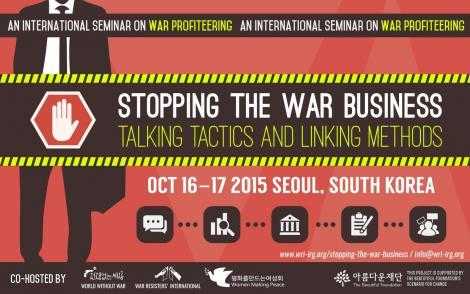

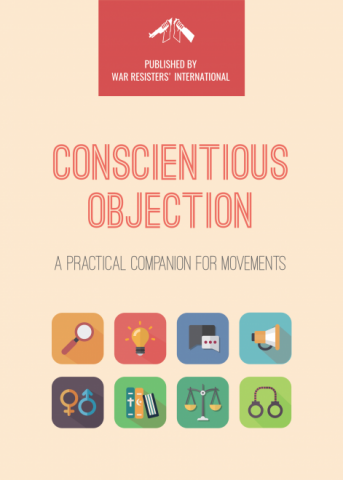
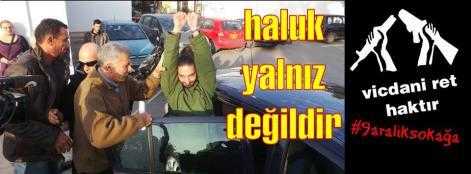
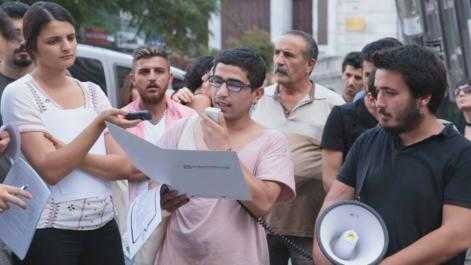
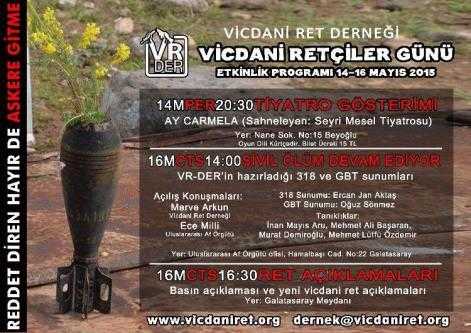
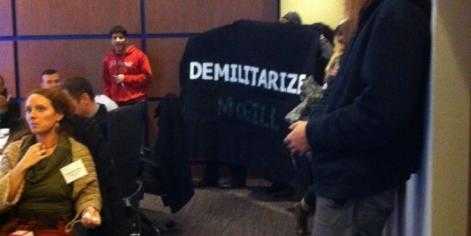
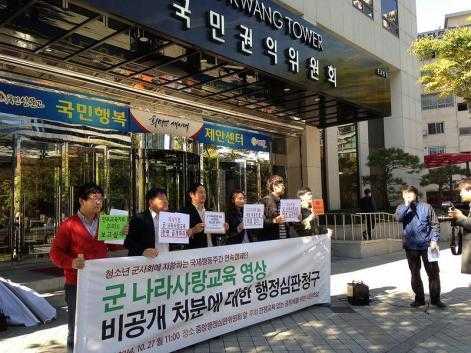
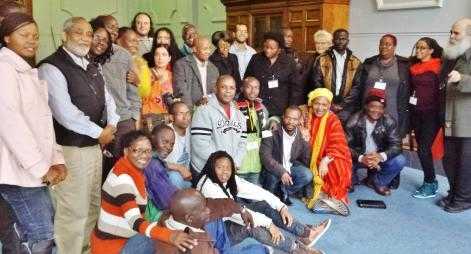
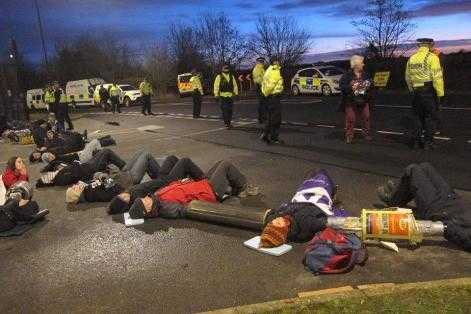
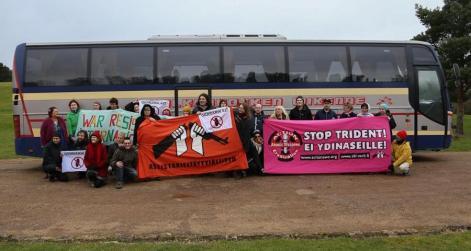
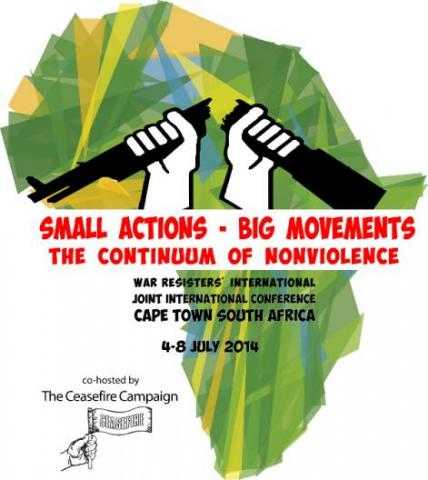
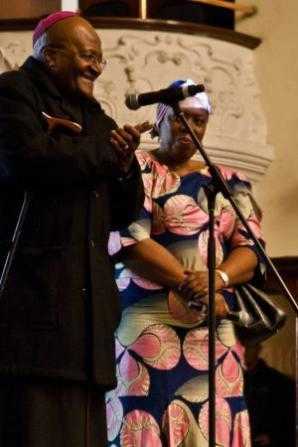
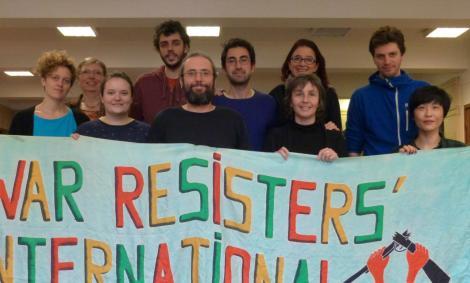
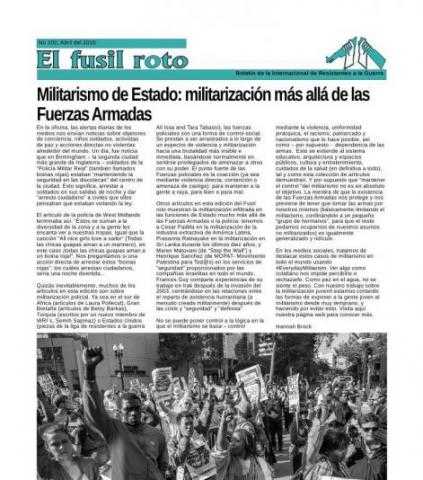
Add new comment